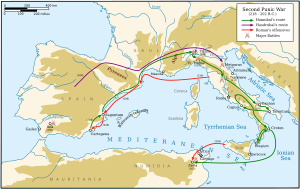Battle of the Guadalquivir (206 BC)
| Battle of Carteia | |||||||
|---|---|---|---|---|---|---|---|
| Part of the Second Punic War | |||||||
 Map of the Second Punic War |
|||||||
|
|||||||
| Belligerents | |||||||
|
|
|
||||||
| Commanders and leaders | |||||||
|
|
|
||||||
| Strength | |||||||
| Unknown | 6,000 soldiers (including 4,000 Celtiberians) 700 Cavalry |
||||||
The Battle of Carteia, also known by the modern name Battle of the Guadalquivir, was a battle of the Second Punic War that took place in 206 BC between the forces of Carthage and the Roman Republic. The name "Battle of the Guadalquivir" is anachronistic, since the river's name "el Guadalquivir", from the Arabic al-wadi al-kabir ("the great valley"), was not used until the Islamic conquest of Spain over nine hundred years after the battle. The Carthaginian forces were commanded by Hanno and the Romans by Gaius Lucius Marcius Septimus. The battle resulted in a Roman victory.
After the Carthaginian defeat at the Battle of Ilipa, the Turdetani flocked en masse to the Roman banner. Hasdrubal Gisco and Mago Barca were thereafter confined with their troops to Gadir where they were protected from a Roman assault. After the Revolt of Sucro and the Revolt of Indíbil and Mandonio, Publius Cornelius Scipio Africanus sent Gaius Lucius Marcius Septimus with a small force uninhibited by baggage so as to augment their speed down the Guadalquivir River to the river mouth. There, the Romans encountered the Carthaginian general Hanno who was attempting to recruit a force of mercenaries for Mago Barca.
Hanno had at his command 700 cavalry and 6,000 infantrymen, of whom 4,000 were Celtiberian warriors and the rest Africans. Gaius Lucius Marcius Septimus attacked the Carthaginian force and surrounded them on a hill.
The mercenaries quickly reached an agreement with the Romans. Marcius further asked Hanno to hand over any prisoners that he had in his care. He further asked them for payment in order for them to be allowed to surrender the hill, after which they could reach an agreement.
Once the mercenaries had come down from the hill, Marcius gave his final demand for the mercenary forces to surrender their arms and return to their respective cities. There was anger and indignation in the Celtiberian ranks at this demand and they refused to surrender their arms. A second round of battle followed. After brave resistance from the Carthaginian forces, over half their number were slaughtered, but many were able to make an escape.
...
Wikipedia
